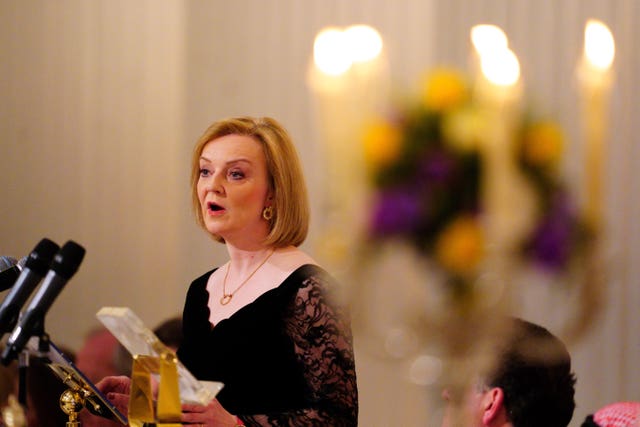UK to send war crimes experts to help Ukraine investigate Russian atrocities
The Foreign Secretary said British expertise will help hold Vladimir Putin’s regime to account for its actions in Ukraine.

The UK is sending war crimes experts to help Ukraine with its investigations into atrocities committed by Russian invaders, Foreign Secretary Liz Truss has announced.
It comes after the death of a British military veteran in Ukraine and as the Foreign Office urgently seeks more information following reports of two British humanitarian workers being detained by Russian forces in the country.
The Foreign Office said the team of experts, due to arrive in neighbouring Poland in early May, will support the Ukrainian government in gathering evidence and prosecuting war crimes and will include experts in conflict-related sexual violence.
Ms Truss said: “Russia has brought barbarity to Ukraine and committed vile atrocities, including against women.
“British expertise will help uncover the truth and hold (Russian President Vladimir) Putin’s regime to account for its actions. Justice will be done.”
Ms Truss is on Friday meeting in The Hague with the president of the International Criminal Court (ICC), which has opened a probe into alleged war crimes in Ukraine.
Moscow does not recognise the authority of the ICC, presenting obvious difficulties.
Meanwhile, the Ministry of Defence said Russia is paying a high price for limited gains of land in Ukraine’s east.
“The Battle of Donbas remains Russia’s main strategic focus, in order to achieve its stated aim of securing control over the Donetsk and Luhansk oblasts,” the department said in its latest intelligence update.
“Due to strong Ukrainian resistance, Russian territorial gains have been limited and achieved at significant cost to Russian forces.”
Western officials said that while the Russians were at times advancing by as little as 1 kilometre a day, their offensive was marked by the indiscriminate use of firepower against civilian targets.
“There is not a building in some of those villages which is being left intact after these artillery bombardments,” one official said.
While the the Ukrainians were also suffering losses in the fighting, officials said they were not on the same scale as those incurred by the Russians and were not having the same impact on morale, officials said.
“Those losses on Russian forces we assess to be having a significant impact on the will to fight of wider Russian forces but the Ukrainian losses are not affecting the morale of the Ukrainian forces,” one official said.
The two British civilians held in Ukraine were working as humanitarian aid volunteers when they were captured by the Russian military on Monday at a checkpoint south of the city of Zaporizhzhia in the south-east of the country, according to the UK non-profit organisation Presidium Network.
International Trade Secretary Anne-Marie Trevelyan told Sky News: “The Foreign Office is doing all it can to support and identify these two people.”
Tributes were paid to British military veteran Scott Sibley, reportedly fighting in support of Ukrainian forces, after the Foreign Office confirmed a British national has died in Ukraine and another is missing without identifying the pair.
The families of both are being supported, a spokesman said, declining to give names or further details.
Fundraisers have received donations of more than £10,000 for the veteran’s family, with Craig Grant writing on one Gofundme page: “To me he was a friend like no other and the bravest person I’ve had the pleasure to have known, he was as good as a brother to me.”
Tributes were also left on the Logistic Support Squadron Facebook page, where a picture was posted alongside the comment: “This week the Sqn has lost a former serving soldier. A man that showed Commando spirit until the end. RIP. Scott Sibley.”

A small number of serving British personnel are believed to have gone absent without leave to join the resistance against the Russian invasion, while veterans and Britons without combat experience are thought to have also travelled to Ukraine.
There was initially confusion on the Government’s position after Ms Truss, in comments during an interview to the BBC on February 26, said she would “absolutely” support UK nationals who chose to fight for Ukraine.
However, she later rowed back on those comments, insisting she had been “expressing support for the Ukrainian cause” in her remarks and that there are “better ways” to contribute to the country’s defence.
Ms Trevelyan said Mr Sibley’s death was “terribly sad” but denied that Ms Truss’ comments had caused confusion.
She told Times Radio: “Terribly, terribly sad news to hear…
“The Foreign Office are working closely with authorities in Ukraine and indeed supporting the family.
“But the Government was clear that the travel advice was: do not go to Ukraine.
“It was clear and it was reiterated many times.”
Meanwhile, around 8,000 British Army troops are to take part in exercises across eastern Europe to combat Russian aggression in one of the largest deployments since the Cold War.
Dozens of tanks will be deployed to countries ranging from Finland to North Macedonia this summer under plans that have been enhanced since the invasion of Ukraine.
Defence Secretary Ben Wallace said the “show of solidarity and strength” will see UK service personnel joining with Nato allies and those from the Joint Expeditionary Force alliance, which includes Finland and Sweden, for the exercises.





